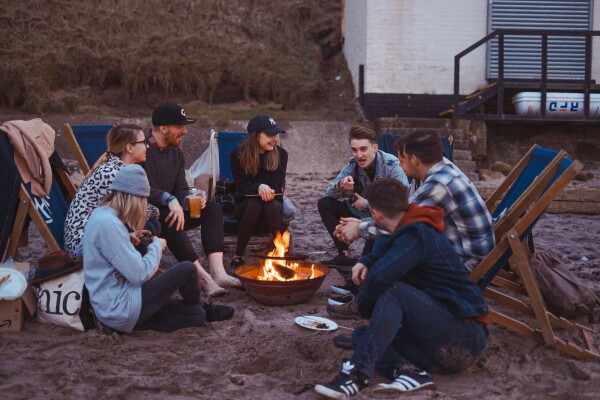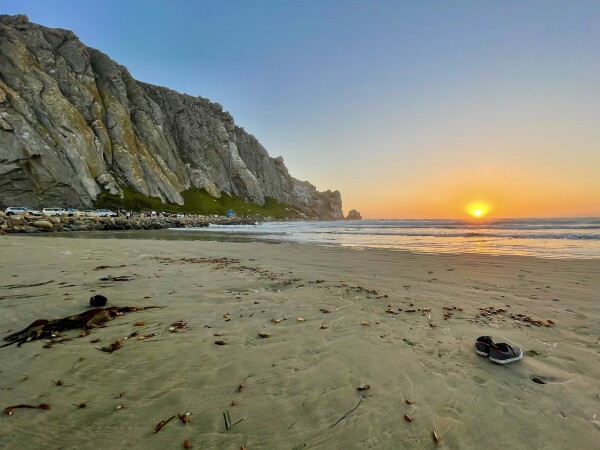Camping by the beach has an undeniable allure. The sun, the sand, the rhythmic sound of the waves — it all contributes to a relaxing, recharging experience.

Photo by Toa Heftiba on Unsplash
However, beach camping also comes with its unique set of challenges. Here are some practical tips and tricks to help you make the most out of your beach camping adventure.
Understanding the Basics of Beach Camping
Venturing outdoors for a beach camping trip can provide a rejuvenating escape. Nevertheless, beach camping requires specific considerations that distinguish it from its forest or mountain counterparts.
Here’s an expanded overview of the essential basics to ensure your beach camping adventure is both enjoyable and safe.
Choosing the Right Location
One of the first things to remember when planning a beach camping trip is that not all beaches allow camping. Some locations have specific restrictions to protect the local ecosystem or to maintain the cleanliness and safety of the beach.
Therefore, doing some research is paramount. Start by identifying a beach that permits camping and familiarize yourself with the local regulations regarding campfires, waste disposal, and interaction with wildlife.
In choosing a campsite, opt for one that’s a bit elevated to avoid the risk of high tides. While the thought of pitching your tent right next to the lapping waves might seem idyllic, it can turn into a soggy disaster when the tide rolls in.
Look for a site with some natural shade if possible. Even with the sea breeze, the sun can be intense during the day, and a bit of shade can offer a much-needed respite.
Checking the Weather and Tides
The dynamic weather of coastal regions is another vital factor to consider. A sunny day can quickly turn into a stormy night, so always check the weather forecast before you embark on your camping trip. Be prepared for sudden changes, pack your gear accordingly, and have a backup plan ready.
You must be aware of the tide timings. The level of the sea changes throughout the day, and the last thing you want is to be surprised by a rising tide in the middle of the night. There are many mobile apps and websites available that can provide accurate tide tables for your chosen location.
Packing the Right Gear
Once you’ve chosen your location and checked the weather and tides, it’s time to pack the appropriate gear. While the basics of camping gear — a tent, sleeping bag, cooking equipment, and all the basic beginner comforts required for camping, etc. — remain the same, beach camping requires a few additional considerations.
Firstly, choose a sturdy, waterproof tent with good ventilation. The beach environment is often humid, and a well-ventilated tent will ensure a comfortable sleep. Opt for a tent made from materials that can withstand the salty sea air and the occasionally harsh coastal winds.
Regular tent stakes might not hold well in the sand, so consider bringing along sand stakes or sandbags to secure your tent. It’s also helpful to have a tarp or some kind of footprint to create a barrier between your tent and the sand. This barrier can prevent the sand from making its way into your sleeping area and help prolong the life of your tent.
Another key item to pack is a durable, wind-resistant beach umbrella or sunshade. The sun can be relentless on the beach, and having a shade source can be a lifesaver during the hot afternoons.
Understanding these basics — choosing the right location, checking weather and tides, and packing the correct gear — will provide a solid foundation for a successful beach camping trip. Remember, preparation is the key to enjoying your time amidst the sand and waves.
Tips for a Successful Beach Camping Experience
Heading to the beach with a tent in tow can be an exhilarating experience. However, it comes with its unique set of challenges. Here are some expanded tips to ensure your beach camping adventure is a resounding success:
Opt for Sand-Proof Items
The beach means sand, and sand has a way of getting into just about everything. When packing for your trip, choose items that are easy to clean or shake the sand out from.
For instance, consider investing in mesh bags for carrying beach essentials, collapsible coolers for your food and drinks, and sand-free mats or rugs for your camping area. These sand-proof items will significantly reduce the amount of sand that ends up in your gear and your tent.
Prioritize Sun Protection
Beaches are known for their beautiful open spaces and sweeping views, but this often means there’s little to no natural shade.
As a result, sun protection becomes a crucial part of your packing list. Be sure to bring plenty of sunblock, a wide-brimmed hat, and sunglasses to protect yourself from harmful UV rays.
Consider packing a beach umbrella or canopy to create your own shade, making your campsite a cool, comfortable sanctuary during the hot afternoon hours.
Be Ready for Windy Conditions
Beaches can be quite breezy, and at times, the winds can be intense. Prepare for this by packing windbreakers and choosing wind-resistant tents.
When setting up your camp, try to position your tent in a way that minimizes its exposure to the wind. This might mean using natural windbreakers like dunes or vegetation.
Also, ensure your tent is firmly staked to the ground to prevent it from being swept away by a sudden gust.
Store Food Properly
While picnicking on the beach is part of the fun, remember that your food can attract birds, raccoons, and other animals.
To prevent unwelcome guests at your campsite, store all food in sealed containers when not in use. If possible, keep your food storage in your car or in bear-resistant containers to deter any curious creatures.
Manage Waste Responsibly
Beaches are beautiful natural spaces that should be preserved for everyone to enjoy. Adopt a “leave no trace” approach during your camping trip and pack all your trash out.
This includes micro-trash such as bottle caps, cigarette butts, and plastic wrappers. Your responsible actions will help ensure that others can enjoy the beach just as you did.
Respect the Local Wildlife
Wildlife encounters can be a magical part of any camping experience. However, it’s essential to respect these creatures and their habitat. Avoid disturbing any animals you encounter, whether they are birds, sea turtles, or crabs, and keep a safe distance. You are a guest in their home.
Stay Hydrated
The combination of sun, sand, and salt can be dehydrating. Drinking plenty of water is crucial to avoid heat-related illnesses. Make sure you pack enough fresh water for your entire camping duration, and don’t rely solely on any freshwater sources that may be at the beach.
Embrace the Beach at Night
Finally, one of the unique joys of beach camping is experiencing the beach at night. The cool breeze, the rhythmic sound of waves hitting the shore, and the vast, starlit sky create an ambiance like no other.
Whether it’s enjoying a bonfire, stargazing, or listening to the serene sounds of nature, nighttime at the beach provides unforgettable memories.
Remember to bring a nightlight or lantern for your safety and convenience, but keep light pollution to a minimum to respect the serenity of the environment, other campers, and the local wildlife.
Wrapping Up: Embrace the Beach Camping Adventure
Beach camping offers an unparalleled way to connect with nature. It blends the thrill of camping with the serene beauty of the ocean.
While it presents unique challenges – from dealing with sand and wind to managing tides – with the right preparation, beach camping can be an unforgettable adventure. Pack wisely, respect nature, and get ready for a unique outdoor experience that combines the best of camping and the beach.
Enjoy the sound of the waves lulling you to sleep and wake up to the beautiful sight of a beach sunrise or beach sunset. It’s an experience that truly encapsulates the wonder of the great outdoors.

















